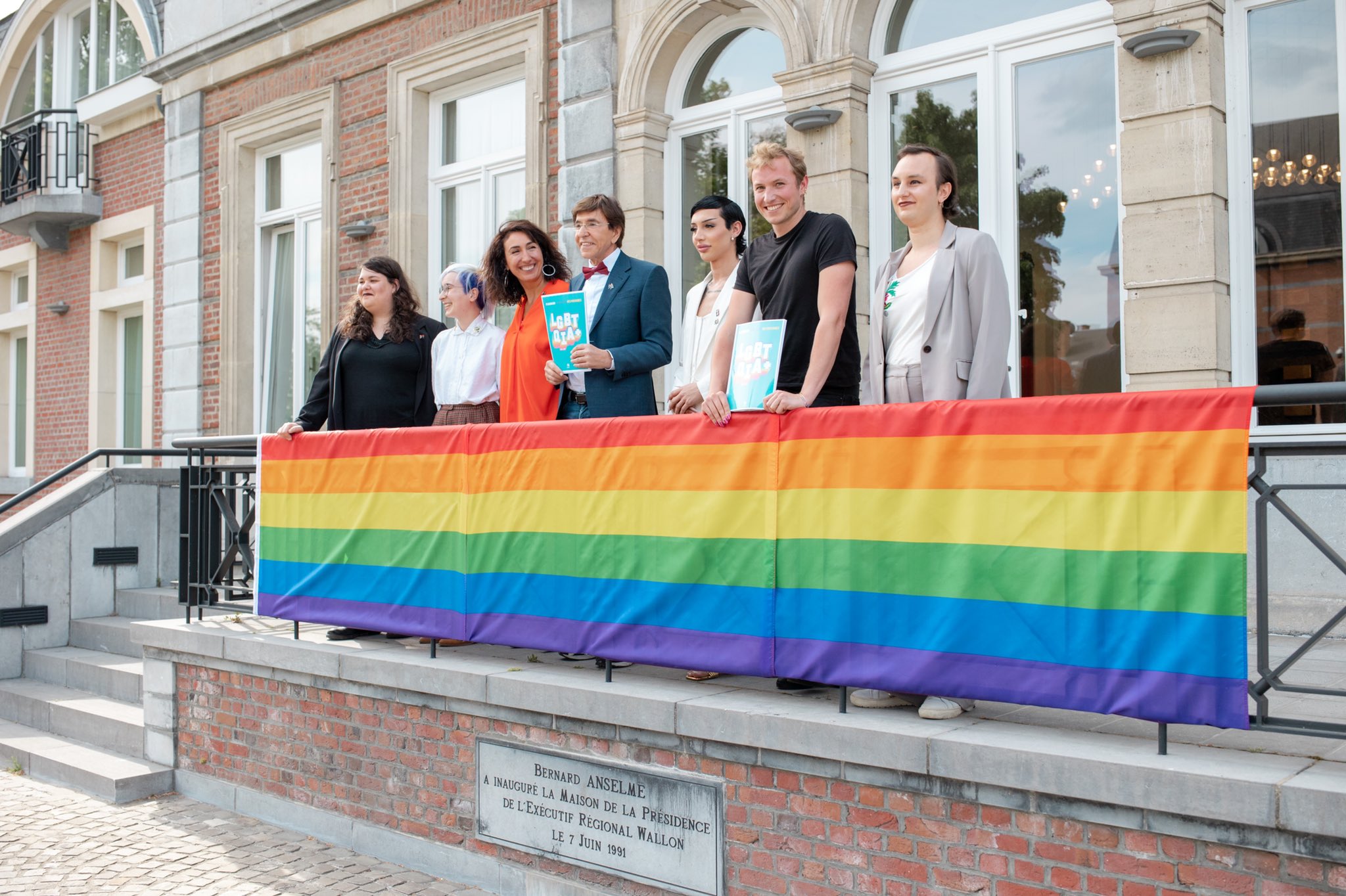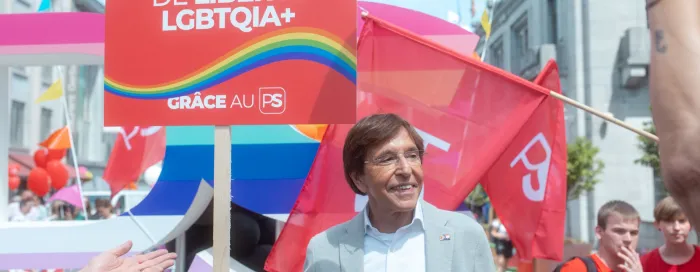This interview is part of our #LoveWhereILive campaign and of our series “#ProgressiveLocalStories”, aimed at raising awareness on the many positive initiatives implemented by progressive cities and regions in Europe. Cities and regions have become laboratories for innovative solutions and, with this series, we want to discover how progressive mayors, councillors and presidents of regions put in place policies to promote and protect LGBTIQ rights.
Your region is setting an example in terms of upholding and protecting LGBTIQ rights. As a progressive leader, what are your thoughts on LGBTIQ rights in your region and in Europe today?
Our country has been at the forefront of the defence and protection of LGBTQIA+ rights and there have been significant changes in our laws in recent decades. However, even in our region, LGBTQIA+ people still experience outrageous acts on a frequent basis. Too often, we see instances of harassment, humiliation, discrimination, violence and suicide making headlines.
We still have a long way to go, which is why in July 2021 Wallonia declared itself an “LGBTQIA+ freedom zone”.

What specific steps have you taken (or do you plan to take) to turn your region into a place where LGBTQIA+ people's rights are fully respected and upheld?
After declaring itself an “LGBTQIA+ freedom zone”, Wallonia adopted the 2022-2024 Walloon LGBTQIA+ inclusion plan on 13 May 2022. It comprises 16 measures grouped according to 5 strategic goals. These include:
- Carrying out a scientific study into the risk of precariousness faced by LGBTQIA+ people.
Despite the lack of recent data on this, it is commonly understood that LGBTQIA+ people are at particularly high risk of precariousness and isolation. We need objective and accurate data on the social situation of LGBTQIA+ people in Wallonia and the mechanisms for excluding them, in order to shape regional policies that better address real concerns. To achieve this, a public procurement process is to be launched by Christie Morreale's cabinet with a view to carrying out a study into the risk of precariousness faced by LGBTQIA+ people.
- Doubling funds allocated to the 7 Maisons Arc-en-Ciel and their regional federation, Fédération PRISME.
The Maisons Arc-en-Ciel and the Fédération PRISME are to be strengthened through increased and permanent funding, in order to make the most of and give more visibility to their expertise and ensure their projects are implemented. Annual funding will be more than doubled:
- The 7 Maisons Arc-en-Ciel will now receive EUR 100 000 per year.
- Fédération PRISME will receive annual funding totalling EUR 140 000.
This funding will mainly go towards continuing and boosting mental health support, legal assistance, STI testing and the provision of emergency shelter to LGBTQIA+ people.
What are the missions of the Maisons Arc-en-Ciel?
- To provide social and legal assistance and mental support to those struggling to live their sexual orientation and identity fully;
- To organise, support and coordinate actions aimed at combating discrimination based on sexual orientation and gender identity, and to promote equal opportunities;
- To support local public or private initiatives aimed at assisting LGBT people;
- To support the emergence of a local network of LGBT organisations;
- To create a meeting space for LGBT associations that are active locally;
- To inform LGBT people and the public.
- Offering specific care for LGBTQIA+ people in medical centres, free of charge.
The Maisons Arc-en-Ciel and LGBTQIA+ associations often deal with people who are in need of medical care, especially mental healthcare. Wallonia has community-based and multidisciplinary services, such as medical centres, offering LGBTQIA+ people assistance that is free of charge and anonymous.
Cooperation is encouraged between medical centres and the Maisons Arc-en-Ciel: agreements are to be signed between each of the 7 Maisons Arc-en-Ciel and one of their local medical centres, to provide LGBTQIA+ people with physical, mental and social care. Every medical centre that is affiliated with the state healthcare system will get a part-time social worker so that comprehensive care can be offered to LGBTQIA+ people referred to them by the Maisons Arc-en-Ciel.
What are the missions of the medical centres?
- To meet people's needs by offering long-term, comprehensive, integrated and quality primary health care that is easy to access:
- quality care that takes the latest science into account while keeping a close eye on efficiency;
- care that is accessible in terms of location, affordability, time, culture, etc.;
- ongoing care provided by a team of healthcare practitioners whose work has a long-term focus;
- comprehensive care that takes into consideration all medical, mental, social and environmental aspects;
- integrated care that encompasses treatment, prevention, palliative care and health promotion;
- To promote the independence of those requesting their services and strengthen their ability to take decisions;
- To foster critical awareness among the public with regard to the mechanisms regulating the organisation of healthcare systems and social policies;
- To contribute to healthcare and social policies, always respecting the values of solidarity and social justice;
- To take part, along with other social actors, in a process of evaluating the community's needs, seeking solutions that are actually implemented, both in the field of health and in other fields that influence the well-being of individuals.
- Offering targeted support to LGBTQIA+ people whose relationship with their family and/or society has broken down.
Numerous young people are still being disowned by their relatives and family simply because of their sexual orientation or gender identity. Wallonia currently has 10 dedicated places (in Liège, Charleroi, Namur and Verviers) for people in such situations. The Walloon inclusion plan is to make these places permanent thanks to EUR 38 000 in annual funding.
Training courses will also soon be organised for staff in charge of welcoming people in difficult social circumstances (night shelters, community housing, etc.), to make them aware of the specific needs of LGBTQIA+ people.
- Including LGBTQIA+ friendly references in Wallonia's public communication campaigns.
Discrimination against LGBTQIA+ people is combated partly through more inclusive communication. With this in mind, the communication and public procurement teams of all Walloon public services are asked to further incorporate the fight against discrimination towards LGBTQIA+ people in their communication campaigns.
- Combating violence against LGBTQIA+ people in the management contract of Wallonia's transport operator (Opérateur de Transport de Wallonie OTW - TEC buses).
Too often, LGBTQIA+ people still fall prey to verbal abuse, harassment and even physical violence on public transport. To counter this, the 2024-2029 management contract of the OTW must help raise awareness to tackle sexism, racism and all other forms of discrimination, including violence against LGBTQIA+ people, in its communication.
- Making elderly LGBTQIA+ people in nursing homes feel more included.
The inclusion of LGBTQIA+ people must be fostered throughout their lifetime. There are currently a good number of elderly LGBTQIA+ people who are unable to openly express their sexual orientation and gender identity in the care centres where they reside. Training and awareness-raising regarding LGBTQIA+ matters will be organised as of now for staff working in the elderly care sector.
Specifically, pilot projects will be carried out in 10 nursing homes. Targeted training will be developed and carried out by AVIQ (the Walloon agency managing well-being, health, disability and family policies), the LGBTQIA+ voluntary sector and a training service provider.
- Offering suitable reception arrangements for LGBTQIA+ migrants.
A pilot project is to be launched in Wallonia to improve reception arrangements for LGBTQIA+ newcomers, especially refugees seeking protection due to their sexual orientation. The Maison Arc-en-Ciel centre in Verviers recently received EUR 28 800 to bolster its cooperation with the Verviers regional centre for the integration of people with a foreign background (CRVI), with a view to welcoming and offering support specifically to LGBTQIA+ people. If the outcome of the pilot is positive, this practice could be extended to the entire region of Wallonia.
- Turning Wallonia into an LGBTQIA+ human rights ambassador within the context of the region's international relations.
Too many countries still believe that LGBTQIA+ people are not entitled to the same rights as heterosexual people. The region of Wallonia must therefore take advantage of every opportunity it is presented with on the international stage to home in on the importance of equality before the law and equal dignity for all people, irrespective of their sexual orientation, gender identity, gender expression or sex characteristics.
An additional sum of almost EUR 2.35 million is being allocated to this initiative during the period 2022-2024, tripling the resources dedicated to the sector.
After being put on hold for two years, Belgian Pride was celebrated once again on 21 May 2022 with “Open” as its theme.
Some 120 000 people paraded through the streets of Brussels calling for more inclusivity, respect and equality for LGBTQIA+ people. I supported the event alongside other political figures.
The European Commission has put forward its first ever LGBTQIA+ strategy and the European Parliament recently declared the EU an LGBTQIA+ freedom zone. What can the European Union do to help advance LGBTQIA+ equality, including outside of the EU, and why is this important for your region?
The fight against homophobia and discrimination and the efforts to achieve the same rights and freedoms as all Europeans for LGBTQIA+ people is a topical matter. I strongly believe that this fight should be foremost in our minds and at the heart of public policy at every level.
It has also been at the forefront of the European institutions' thoughts for many years now. The European Union Treaties provide protection for minorities in Europe (Article 19). This is also one of the objectives of the EU Charter of Fundamental Rights (Article 21). Equality and non-discrimination based on sexual orientation are fundamental principles of the European Union.
In recent decades, the European Commission has taken a number of steps to improve the life of numerous LGBTQIA+ people, notably issuing directives or action strategies.
In July 2021, the Commission took legal action against Poland and Hungary for violating the fundamental rights of LGBTQIA+ people. This could lead to sanctions and to the case being referred to the Court of Justice of the European Union. These procedures are an important tool the EU has at its disposal to protect the rights of LGBTQIA+ people and sanction Member States that do not respect EU values.
Last November, the Commission presented an important strategy in favour of equality for LGBTQIA+ people. Of the proposed measures, we note the fight against discrimination, the assurance of safety and the ambition to build inclusive societies. The strategy also establishes a specific course of action for achieving LGBTQIA+ equality outside the EU.
This is key given that the struggle is not limited to our borders. The world is rife with different forms of discrimination and the EU must be in a position to act as a driving force to combat them. Europe enjoys a world-class reputation as a protector of values, human rights and its founding principles. These interconnections with the world must enable Europe to turn this issue into an international cause. Thus, the Commission and the External Action Service (EEAS) commit to protecting LGBTQIA+ people and to making it possible for them to claim their rights around the globe.
The Commission also provides financial support to a host of civil society organisations that promote LGBTQIA+ rights. These include the European branch of the International Lesbian, Gay, Bisexual, Trans and Intersex Association (ILGA-Europe).
Tenders are also launched each year to fund programmes set up by national bodies for initiatives that support the fight against discrimination and the promotion of equality. This financial support is necessary for these efforts to continue.
I applaud the action the European Commission is taking to protect LGBTQIA+ people. It is key for my region, which likewise considers this cause a priority. Representing this minority is of core importance to my region as we are fully committed to the European project and to the defence of our fundamental values and principles.
